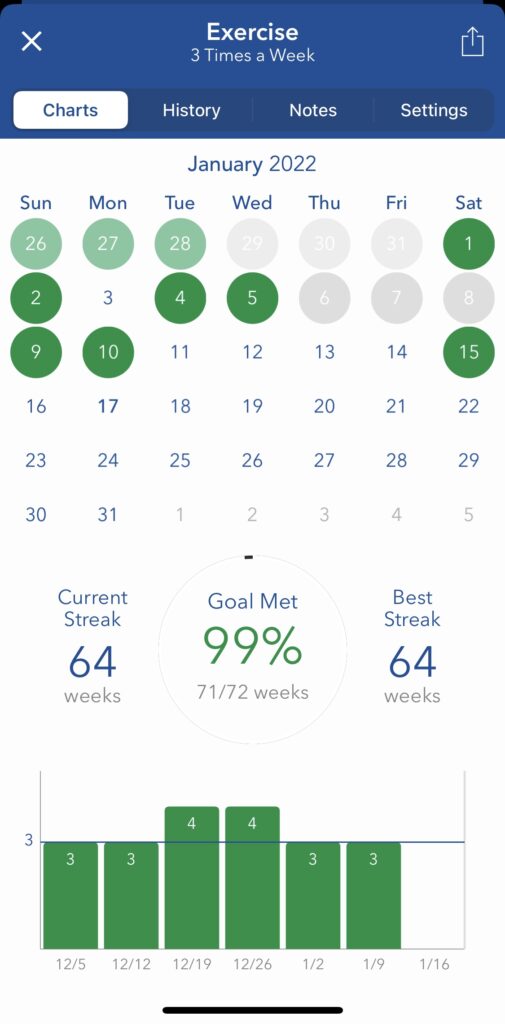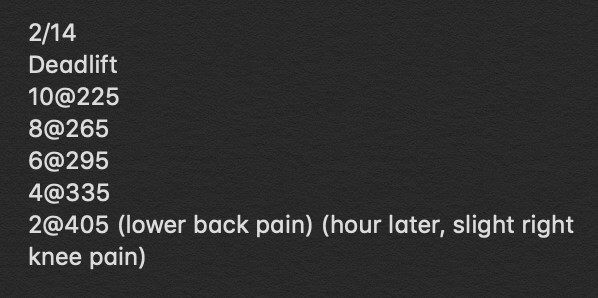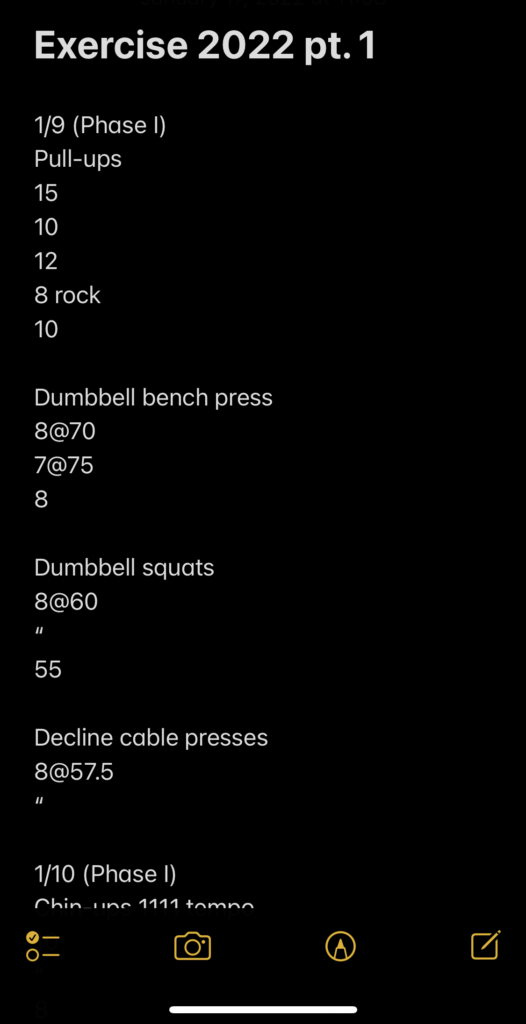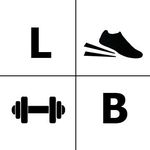As lawyers, we track large portions of our lives. We often track billable hours, CLE credits, and reimbursable expenses. Many of us also check how many billable minutes we lose each time we get up to grab a cup of coffee. With all this tracking in our jobs, should we also track our workouts?
It depends, but probably. I resisted tracking my workouts for years. I figured, as long I’m going to exercise and I work ‘hard,’ that’s good enough, right? At the time, it was, but I’ve since learned that tracking my workouts has many benefits.
Benefits
It keeps me accountable
In late 2020, I set a goal to workout 3 or more times per week. I reasoned that this was a pace I should be able to sustain through a busy career and life. Tracking my workouts means that I can’t make excuses, and I can’t let my faulty memory pretend I completed a workout if I didn’t.
It takes the choice out of it.
I have a high internal drive, but everyone has times of weakness. While exercise has become a habit, there are still times when I would feel too busy or too tired to make myself workout if I did not have a workout goal. Having a goal of three workouts per week also helps me think ahead. Each week when I look at my schedule for the upcoming week, I briefly consider which days I need to workout so that I don’t arrive on Saturday starting with zero.

It helps track injuries
While my workouts consist almost entirely of listing some basic numbers, I will also note if I feel pain from any movement or after a workout. When I injured my back in 2018, my notes allowed me to pinpoint for my physical therapist which movements caused pain and when they occurred.

Brief review reveals stagnation
If you’re at your desired level of fitness, tracking your workouts will help you notice if you start to slack off or if your body starts sending signals that something is wrong. When I ran cross-country in high school, for example, the coach would always suggest that female runners check their iron levels or take an iron supplement if they notice a drop off in performance. For people looking to improve their fitness, logging your workouts will show you whether you’re pushing yourself to improve a little each week. Have you been lifting the same weight for the past two months? Maybe it’s time to try more weight or more reps. Have you run the same distance at the same speed for the last 10 runs? Maybe it’s time to try running further or faster.
Pitfalls: when I stop tracking
With all these benefits, there are still a few intentional times where I’ve found that tracking is not worth it.
When it’s disruptive
I recently tried using a Fitbit. After many years of trips to the gym, my Timex Ironman finally gave up the juice. I switched to using a Fitbit fitness tracker for my workouts. The tracker had a feature where it would remind me to walk 250 steps each hour by vibrating on your arm. While I’m sure there are some benefits to moving every hour, this was annoying as hell. I found it way too distracting to have my tracking buzzing my arm while I was deep into drafting a legal document or focusing on a client call. Movement is good, but I didn’t need the aggravation of those hourly reminders. Feature deactivated.
During workouts with a mindful focus
On rare occasions, it can feel freeing to go for a short run or a walk with no encumbrances. No phone, no trackers, no music; just the sound of nature and the feeling of wind on your face. Most of the time, I love to listen to books, music, or podcasts while working out, but removing everything and truly disconnecting sometimes is a freeing experience. Your social media and work emails can go unchecked for 30 minutes.
It drives you nuts
If tracking your workouts will cause you a ton of stress, it may be because you haven’t developed it into a habit yet or because you haven’t started making progress in your fitness journey. When tracking your workouts yet has not become a habit yet, it may be worth trying it for a few months to see whether the annoyance and stress recede. And if you haven’t made progress in the first few weeks, that’s fine. The point of tracking is so that you can see the progress after you make any needed fitness changes.
If, however, you’ve tried it for many months, are making progress, and still hate tracking, then perhaps the downsides are not worth the benefits.
How I track my workouts
At the gym
One day I heard Tim Ferriss say that he logs all his workouts in notebooks. I decided I would not be ‘that guy,’ carrying a big yellow pad around the gym. The look is not for me. For my gym workouts, I use Apple notes. I log where I workout, what sets I do, and at what weights. That’s it. I log the workouts while walking around the gym between sets to save time.

Running
Since 2013, I’ve had the running app, Runkeeper, downloaded. For several years, I didn’t use it actively, but have for several years now. I won’t attest to it being any better than other running apps (e.g., Nike Run Club App, Strava, MapMyRun), but it has all the functionality that I want in a running app, so I haven’t bothered to change.
Spinning and everything else
For other activities that count as a workout, I just make a brief note in my Apple notes. Nowadays, Fitbit will also record these workouts, if I’m wearing them, but if you don’t use a fitness tracker, making a simple note will still keep you accountable. My main goal is to know that I completed my workout. If it was some form of cardio activity, I’ll just log the activity, and possibly the amount of time. I keep it simple.
To track or not
Is tracking your workouts the right move for your fitness? Consider giving it a try, and keep working on your LawyerBody.



